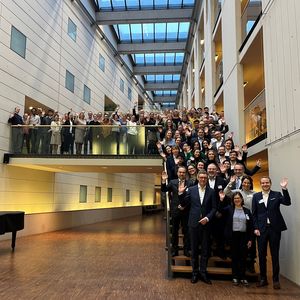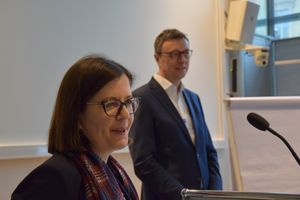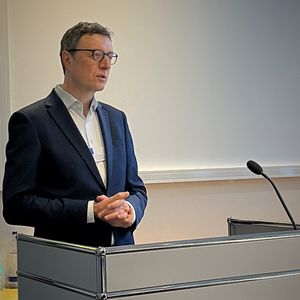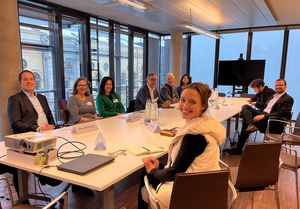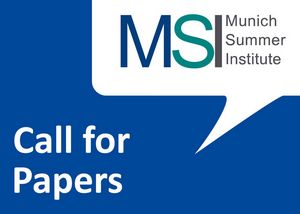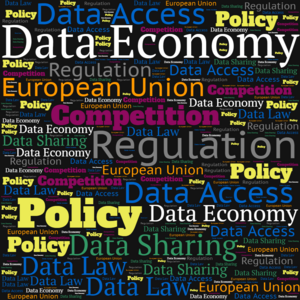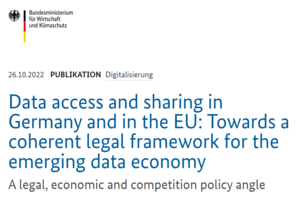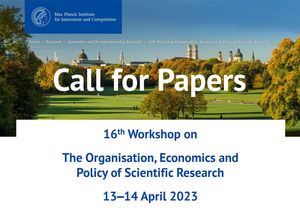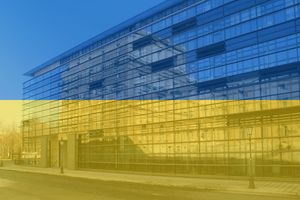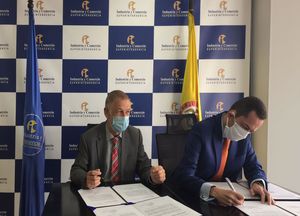Submission Process and Contact Details
Please send us your anonymised abstract (300 - 500 words) on the conference topics described in the Call for Papers by 31 May 2023.Your submission should be accompanied with your short bio / CV / list of publications in a separate document (max. 2 pages). Every paper selected shall be presented at the conference and the conference proceedings shall be published in an open access format (de Gruyter series on Global and Comparative Data Law). Presenters will be required to convert their presentation for the publication and submit them by 31 December 2023. Presenters will receive – subject to specific conditions – travel allowance and lodging. Updates on the conference will be posted at the Institute’s website and at www.jura.uni-passau.de/globaldatalaw. Please send submissions and / or inquiries to fredi.digitalisierung(at)uni-passau.de.

Call for Papers: Global Data Law Conference Series – Comparative Data Law
The conference is co-organised by the University of Passau Research Centre for Law and Digitalisation (FREDI) and the Max Planck Institute for Innovation and Competition. The event is the final part of a three-tier conference series on Global Data Law and element of a greater research agenda with respect to Global Data Law & Policy. With this call for papers, we are inviting academic scholars to contribute to the conference.
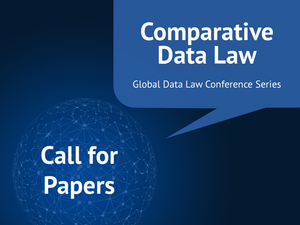
![[Bitte nach "english" übersetzen:] Cover of the CDTM Trend Report “Tackling Climate Change in the AI Era”](/fileadmin/_processed_/9/c/csm_Trend-Report_Climate_Change_245bbf9de3.png)
Tackling Climate Change in the Era of Artificial Intelligence
Climate change is one of the biggest challenges of our time, confronting us with cascading effects if no action is taken now. How can we cope with climate change with the support of AI solutions? As a member of the Bavarian AI Council, Dietmar Harhoff leads the project group “AI for Climate Protection”. A first project in cooperation with the Center for Digital Management and Technology (CDTM) of TUM and LMU has now been successfully completed – the Trend Report on “Tackling Climate Change in the AI Era”.
Using AI in sectors such as agriculture, energy and transportation can lead to economic benefits while reducing greenhouse gas emissions. How can this technology be leveraged to create tangible impact and pursue a transformation that creates opportunities for all? How to develop ethical and trustworthy AI systems without a large carbon footprint? The CDTM Trend Report looks into these questions and provides an understanding of the potential of AI for tackling climate change in the next 20 years. It describes trends (political and legal, economic, social and environmental, technological, as well as business models) that explain the current and upcoming challenges of climate change, identifies potential future scenarios, and innovates new business models, ensuring a balance between sustainability, technology, and future prosperity.
The report was developed within the framework of the trend seminar at the CDTM, where 25 young innovative students from interdisciplinary backgrounds conduct holistic trend research over seven weeks on a specific, future-oriented topic. In the basic phase, a comprehensive trend analysis is prepared, the scenario phase is used to develop four future scenarios, and in the ideation phase, five future-proof digital business models are elaborated. In their work, the students were supervised, among others, by Anna-Sophie Liebender-Luc, who is now a Junior Research Fellow and Doctoral Student at the Institute.
Dietmar Harhoff presented the Trend Report to Judith Gerlach, Bavarian Minister of State for Digital Affairs, at AI.BAY2023, the 1st International AI Conference of the Bavarian AI Network baiosphere, held at the Deutsches Museum in Munich on 23 February 2023.
Directly to the CDTM Trend Report “Tackling Climate Change in the AI Era”.
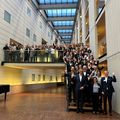
Institute Visit by the President-Elect of the Max Planck Society, Patrick Cramer
On 24 January 2023, Patrick Cramer, the President-elect of the Max Planck Society, visited the Institute. He will take over from Martin Stratmann on the 75th anniversary of the Max Planck Society in June 2023 in Göttingen, where the Max Planck Society was founded. Cramer’s goal is to have visited and become acquainted with all 86 Institutes of the Max Planck Society by the time he takes office. He was impressed by the societal relevance of the research conducted at the Institute.
At its meeting on 23 June 2022 in Berlin, the Max Planck Society’s Senate appointed Patrick Cramer as new President-elect of the Max Planck Society for the term of office from 2023 to 2029. The 54-year-old chemist and molecular biologist currently is Director of the Max Planck Institute for Multidisciplinary Sciences in Göttingen. He will take over the role from Martin Stratmann in June 2023 in Göttingen, where the MPG was founded, on the occasion of the 75th anniversary of the Max Planck Society. Stratmann was at the helm of the Max Planck Society for nine years.
By the time he takes office as president of the Max Planck Society in June, Patrick Cramer wants to have visited all 86 Max Planck Institutes. A lofty goal that is within reach: Since July 2022, Cramer has visited nearly two-thirds of the Institutes. Our Institute was number 54 on his list. He was accompanied by Dr. Katja Ketterle, Head of the Institutes Department of the Max Planck Society, and Dr. Sabine Gieszinger, Institute Support.
Thus, on the morning of 24 January, after a joint photo session, the entire Institute gathered for a brief address by the President-elect, followed by a question and answer session.
Cramer spoke of a triad of core values of the Max Planck Society. First, he mentioned excellence, although pure scientific excellence would not suffice. It is also about the personalities and people around whom the Institutes of the Max Planck Society are built. The so-called Harnack principle is an essential part of the Max Planck Society’s strategy and crucial for attracting other outstanding minds. It is equally important to communicate and explain the work of top researchers to the public. Finally, the third core value he cited was the sense of unity among all employees of the Max Planck Society.
“We all are Max Planck,” Cramer emphasized in an open exchange with the Institute’s employees. It is the task of all employees to contribute to the goals of the Max Planck Society. It is equally important that the ideas of all members of the “Max Planck Family” are heard. The President-elect showed that he was open to the wishes, questions and suggestions of everyone.
He also answered personal questions. Just three years ago, he said, he could not have imagined that he might put his own research on hold in favor of his new responsibilities. Cramer has been director of the Göttingen Institute since 2014; before that, he was professor of biochemistry at LMU Munich and director of the Munich Gene Centre.
Cramer has made significant contributions to the development of life sciences, both through his own research and by mentoring and promoting young scientists. He solved the three-dimensional structure of one of the largest enzymes in the nucleus, RNA polymerase. This work enabled his team to unravel the mechanisms of gene transcription. Gene transcription is the process by which living cells make copies of their genes, which then serve as blueprints for the production of proteins. Shortly after the outbreak of the Covid-19 pandemic, Cramer and his group visualized how the coronavirus copies its genetic material. The team also showed how the Covid-19 drugs Remdesivir and Molnupiravir interfere with this copying process.
But now, Cramer said, he embraces the challenge of the new office and is convinced that it is important to help shape the future of science and bring new knowledge into the world for the benefit of all people.
In the further course of the visit, a group discussion was held with representatives of the researchers, IT, science communication and equal opportunity officers, in addition to discussions with the directors. Finally, a poster presentation of the Institute’s research highlights took place in a smaller circle.
Cramer was impressed by the social relevance of the research conducted at the Institute, highlighting in particular research on the transition to a sustainable economy, support for emerging economies, or on AI and the protection of private data. Katja Ketterle, head of the Institutes Department, emphasized how inspiring the brief insights into the research were and that the Institute also had a great team in other areas, making it one of the particularly fine small Institutes within the large Max Planck Society.
We thank you for your visit and look forward to further exchange!

Reto M. Hilty signs cooperation agreement with the University of São Paulo
On 11 January 2023, Reto M. Hilty signed a research cooperation agreement between the Institute and the Faculty of Law of the University of São Paulo (FDUSP). This cooperation is part of the “Smart IP for Latin America” (SIPLA) Initiative, which provides a neutral forum for academic and legal policy discourse on intellectual property and competition law in Latin America. In addition to the existing observatories in Argentina and Colombia, an academic observatory will now also be established in Brazil.
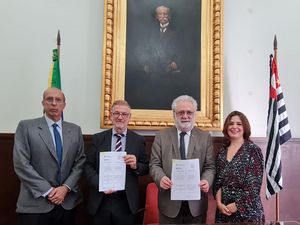
Prof. Dr. Celso Fernandes Campilongo, Director of FDUSP, emphasized at the signing ceremony that partnerships such as this are fundamental for the advancement of FDUSP's faculty and students. This cooperation will develop projects that will serve to better use the creative and technological potential of Latin America to best meet the social, cultural, and economic needs and interests of this region of the world. Joint publications and events complement the research cooperation portfolio.
The first events are already in preparation: On 26 April 2023, the SIPLA Annual Conference will take place in São Paulo. The main topics will be technology transfer and regional innovation. The conference will be rounded off by four internal workshops devoted to the further development of SIPLA projects already underway in the areas of copyright, patent law, competition law, and trade secrets protection.

Call for Papers – Munich Summer Institute 2023
The 7th Munich Summer Institute, jointly organized with ETH Zurich, HEC Lausanne, Northeastern University, LMU and TUM, will take place from 24 to 26 May 2023. Researchers who would like to present a paper are invited to submit it online until 15 February 2023. After the successful premiere last year, a workshop for Ph.D. students will be held again this year, on 23 May 2023.
We plan to hold the Munich Summer Institute 2023 as an in-person event (no hybrid meeting) in Munich. The Munich Summer Institute will be preceded by the second MSI Ph.D. Workshop on 23 May 2023.
The Summer Institute will focus on three areas:
- Digitalization, Strategy and Organization
(chairs: Tobias Kretschmer and Christian Peukert), - Innovation and Entrepreneurship
(chairs: Dietmar Harhoff, Joachim Henkel and Hanna Hottenrott), and - Law & Economics of Intellectual Property, Innovation & Digitalization
(chair: Stefan Bechtold and Imke Reimers).
The goal of the Munich Summer Institute is to stimulate a rigorous in-depth discussion of a select number of research papers and to strengthen the interdisciplinary international research community in these areas. Researchers in economics, law, management and related fields at all stages of their career (from Ph.D. students to full professors) may attend the Munich Summer Institute as presenters in a plenary or a poster session, as discussants, or as attendants. The Munich Summer Institute will feature three keynote lectures, 12 plenary presentations and a daily poster session (including a poster slam). The Munich Summer Institute focuses on quantitative empirical research.
The Munich Summer Institute will be held at the Bavarian Academy of Sciences and Humanities in the heart of Munich. Participation is by invitation only. The Munich Summer Institute will fund hotel expenses for all plenary speakers, poster presenters and invited discussants. It is expected that participants fund their own travel. The Munich Summer Institute may provide limited travel scholarships in case of financial hardship.
Keynote Speakers
- Nigel Melville, University of Michigan
- Jana Gallus, University of California at Los Angeles
- David Schwartz, Northwestern University
Paper submission procedure
Researchers who would like to present a paper are invited to submit their paper online until 15 February 2023 at http://editorialexpress.com/conference/msi2023. The Munich Summer Institute only considers papers which have not been published or accepted for publication at the date of submission. Paper selections will be announced in mid-March 2023. The program of the Munich Summer Institute will be available in early April 2023. All accepted papers will be made available to all participants on 14 May 2023. Researchers who would like to attend the Munich Summer Institute without giving a presentation should contact one of the organizers by 15 April 2023.
Further information
More information is available at the MSI website. Any questions concerning the Munich Summer Institute should be directed to Stefan Bechtold, Dietmar Harhoff, Joachim Henkel, Hanna Hottenrott, Tobias Kretschmer, Christian Peukert, or Imke Reimers.

Bucharest Conference on “Building a Global Ethical Framework for AI: The UNESCO Recommendation on the Ethics of AI”
On 4 October 2022, Dietmar Harhoff, member of UNESCO’s High-Level Expert Group (HLEG) on the Implementation of the AI Recommendation since December 2021, participated as an expert in the conference on “Building a Global Ethical Framework for AI: The UNESCO Recommendation on the Ethics of AI” in Bucharest, which addressed the guidelines on the design, development, and use of AI systems adopted in November 2021. The conference focused on the need to promote diversity and inclusiveness, and how to move from principles to practice to assess the ethical impact of Artificial Intelligence on society.
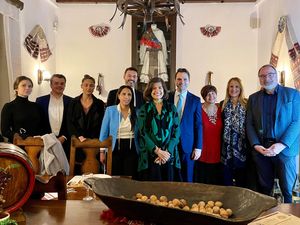
On 23 November 2021, the 193 Member States at UNESCO’s General Conference adopted the Recommendation on the Ethics of Artificial Intelligence, which is the first global normative in the field responding directly to the need for clear, ethically informed guidelines on the design, development and use of AI systems. This very first global standard-setting instrument on the subject is to not only protect but also promote human rights and human dignity, and will be an ethical guiding compass and a global normative bedrock allowing to build strong respect for the rule of law in the digital world.
The international conference on the UNESCO Recommendation was organized by the Romanian Ministry of Research, Innovation and Digitalization (MCID), together with UNESCO and two of the most prestigious Romanian Universities – West University of Timişoara (UVT) and Politehnica University of Bucharest (UPB) – and was held at the premises of Politehnica University of Bucharest in presence of Gabriela Ramos, Assistant Director-General for the Social and Human Sciences of UNESCO, and Sebastian-Ioan Burduja, Minister of Research, Innovation and Digitalization.
The event brought together a wide array of stakeholders from science, legal practice, policy, and civil society to discuss the UNESCO recommendation and its ability to serve as a global instrument for the ethical design, development and deployment of Al.
The conference centered around two main themes: the need to promote diversity and inclusiveness, and how to move from principles to practice to assess the ethical impact of AI on society.
Dietmar Harhoff was a keynote speaker and shared his professional vantage points to the first panel to discuss and explore issues such as the lack of diversity and inclusiveness in AI, algorithmic bias and discrimination, as well as possible measures to address these issues. However, he also pointed to the difficult trade-off between regulation and incentives for innovation.
Directly to the UNESCO Recommendation on the Ethics of Artificial Intelligence.
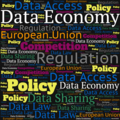
Expert Study Sees Need for Action in the Regulation of Data Access Rights
On 26 October, the German Federal Ministry for Economic Affairs and Climate Action (BMWK) published a comprehensive scientific expert study on data access entitled “Data access and sharing in Germany and in the EU: Towards a coherent legal framework for the emerging data economy”. The report was prepared by our senior research fellow Heiko Richter in co-authorship with the Berlin professors Heike Schweitzer, Axel Metzger and Knut Blind and other authors.
Data is at the heart of the ongoing digital transformation of the economy and society. In many different ways, access to data is becoming a precondition for innovating and for competing effectively. Against this background, both the European and the German legislator are striving to develop a legal framework for the data economy that facilitates voluntary agreements on data access and sharing and mandates data portability and/or data access where it is needed to protect – and sometimes to promote – competition.
The BMWK has asked the consortium consisting of lawyers and economists to determine whether the emerging legal framework is fit for the task of protecting and, where necessary, promoting competition, and to outline options for action in case of deficiencies. In fact, the inventory of the legal rules relating to data access and data sharing currently in place provides evidence of a great degree of legal uncertainty. Legal institutions, i.e. well-defined (intellectual) property rights, contract law principles and competition law principles, are only emerging. On the basis of this stocktaking exercise, the study discusses the need for reform and explores policy options. These relate to the European Commission’s proposal for a Data Act, European and German competition law including merger control, the Digital Markets Act and Section 19a GWB (German Act against Restraints of Competition), as well as the legal framework for data intermediaries.
The expert study is available at the following link:
Data access and sharing in Germany and in the EU: Towards a coherent legal framework for the emerging data economy

Call for Papers – 16th Workshop on the Organisation, Economics and Policy of Scientific Research
WOEPSR is coming back to Munich! After the 14th workshop of the series in 2020, the “16th Workshop on the Organization, Economics and Policy of Scientific Research”, jointly organized with TUM, will again take place at the Max Planck Institute for Innovation and Competition on 13 and 14 April 2023. Researchers who would like to present a paper are invited to submit it online by 15 January 2023.
The workshop was originally launched in Turin, but is now also held at other major research locations such as the Centre for Research on Entrepreneurship and Innovation at the University of Bath (2018), GREThA at the Université de Bordeaux-CNRS (2019), and KU Leuven (2022).
The organisers aim to attract contributions from both junior and senior scholars on topics related to the organisation, economics and policy of scientific research. A minimum number of slots are reserved for junior researchers (PhD students or postdoc scholars who obtained their PhD in 2020 or later).
Contributions are invited on (but not limited to) one or more of the following topics:
- Organisation of research activities in universities, PROs and private R&D labs
- The evaluation of science policy
- Science in the private sector and spillovers from scientific research
- Role of individual researcher characteristics in scientific research
- Science research networks and collaboration
- Scientific careers and mobility
Please submit previously unpublished papers or extended abstracts (min 3 pages) by 15 January 2023.
We strive to notify authors by 27 February 2023.
Download Call for Papers.
More information and submission of papers on the workshop website.

The Max Planck Institute for Innovation and Competition Is Committed to Support Ukrainian Researchers
Both the legal and economic departments of the Max Planck Institute for Innovation and Competition offer to support Ukrainian researchers fleeing from war in their home country. We also invite Ukrainian researchers to turn to us whose stipend or employment abroad ended recently and who are now looking for a way to continue their research outside Ukraine. The Institute provides office space, access to the library, a stipend for at least six months (extendable), and support for searching accommodation.
Scholars with a background or interest in Competition Law, Intellectual Property Law, Innovation Economics or Entrepreneurship Research should reach out to scienceforukraine(at)ip.mpg.de. This applies to doctoral students and established scientists alike.
Update from 4 May 2022
Since the publication of this information, numerous applications have been submitted. So far, eight scientists have been welcomed to the Institute. Two people are now conducting research in the department of Reto M. Hilty, and three each in the department of Josef Drexl and the department of Dietmar Harhoff. In addition to integration at the Institute, team members have helped with interpreting, finding a kindergarten place, organizing school places, and finding housing for the researchers and their relatives. In total, seven relatives, including five children, accompany the refugees. To strengthen contacts with and among the new colleagues, excursions were organized and the guests were even invited privately to an Easter brunch. All of this cannot make the cruel war in Ukraine forgotten, but hopefully it will make it a little easier for the newly arrived to settle into their new environment.

Smart IP for Latin America: Further agreement signed as part of the initiative
On 16 February 2022, Reto M. Hilty signed an agreement with the Colombian Superintendent for Industry and Commerce Andrés Barreto González. The aim is to jointly work on studies and workshops in the field of intellectual property and competition law.
As a result of the cooperation between the Institute's SIPLA initiative and the Colombian Superintendencia de Industria y Comercio (Superintendence of Industry and Commerce), both partners expect that research results from collaboratively identified projects will help to define governmental measures in a targeted manner and to implement them more efficiently.
A similar partnership has already been established with Argentina, and further agreements of this kind in Latin American countries are to follow in the future.
About SIPLA
Smart IP for Latin America is a research initiative of the Max Planck Institute for Innovation and Competition. It provides a neutral forum for academic and legal policy discourse on intellectual property and competition law in Latin America. It aims to inform and advise academia, policymakers, the business sector and the public on the basis of impartial and evidence-based fundamental research. The goal is to support the realization of Latin America’s social, cultural, and economic potential.
Smart IP for Latin America was launched in 2018 at an inaugural conference in Santiago de Chile, attended by representatives from academia, government, industry, and legal practice. An office at the University of Buenos Aires – the “Observatory” – has been coordinating research activities and events on site in close cooperation with the SIPLA team at the Institute in Munich since 2019. The team is supported by a top-class advisory board with scientific representatives from all over Latin America.

![[Bitte nach "english" übersetzen:] Cover of the CDTM Trend Report “Tackling Climate Change in the AI Era”](/fileadmin/_processed_/9/c/csm_Trend-Report_Climate_Change_39e1ad939d.png)
